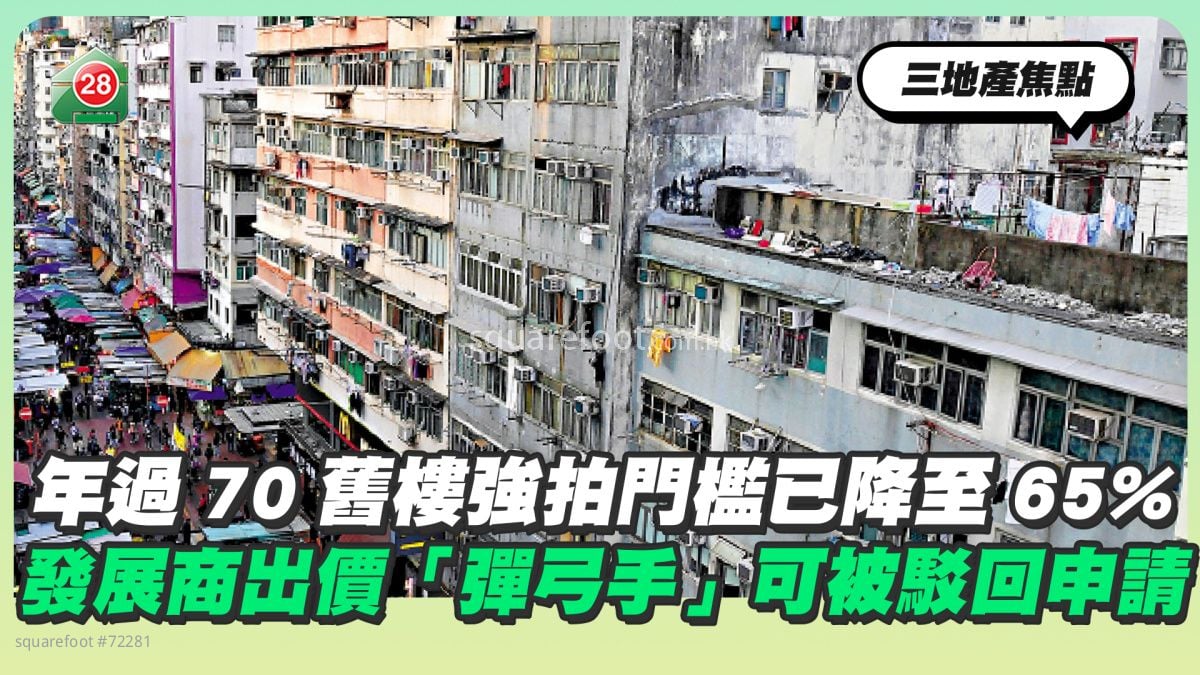- Home
- News
- Expert Blog
- Wed Property Focus
- 3 Key Conditions For Compulsory Sale Applications Of Old Buildings You Need To Know
When developers cannot acquire full ownership of a building, they may apply for a compulsory sale. However, approval for such applications is not guaranteed and can be rejected. Why might an application be denied, and what can developers do in such cases?
Typically, when developers identify an old building as a potential redevelopment site, they initiate the acquisition process by negotiating purchase agreements with individual unit owners. If all owners agree to sell, the developer gains full ownership of the building and can apply for government approval to demolish and redevelop it.
However, it’s common for some owners to refuse to sell their property, leaving developers unable to secure full ownership. To address this, the government introduced the Land (Compulsory Sale for Redevelopment) Ordinance, which aims to expedite the redevelopment of aging buildings.
Recent amendments to this ordinance have introduced updated thresholds for compulsory sale applications, which vary based on the building's age and location. For buildings older than 70 years, the ownership threshold has been reduced to 65% regardless of location. For buildings aged 50 to 59 years or 60 to 69 years, the thresholds are 70% and 65% in designated areas, while non-designated areas maintain the higher thresholds of 80% and 70%.
Meeting these ownership thresholds is not the sole requirement for a successful compulsory sale application. Developers must also fulfill two additional criteria. First, they need to show that they made genuine efforts to purchase the remaining units at fair market prices. Second, the building's age or condition must make redevelopment a more practical and beneficial option compared to simply repairing the existing structure.
A recent case involving Sun Ming Building in Ap Lei Chau underscores the importance of adhering to these criteria. This 8-story mixed-use building, which includes six ground-floor shops and six residential units per floor, occupies a site of approximately 4,060 square feet. In 2023, the developer applied for a compulsory sale of the property, valued at over HK$260 million. However, the application was rejected due to several factors.
One key issue was the developer’s failure to offer reasonable purchase prices for the remaining units. The Lands Tribunal found that offers made between 2023 and 2025 were 8 to 13% lower than the property’s assessed market value in late 2022. Additionally, after reaching the ownership threshold, the developer withdrew agreements with some shop owners and significantly lowered their offers, further undermining the fairness of the process.
Another issue was poor management of the building after the developer acquired approximately 80% ownership. Neglecting maintenance, they left windows open in acquired units, causing water damage, and allowed trees on the rooftop to grow unchecked, which damaged the waterproof membrane and concrete structure. These actions negatively impacted the remaining owners and demonstrated a lack of due care.
Finally, the Lands Tribunal concluded that the developer did not take reasonable steps to acquire the remaining units or offer prices that reflected fair market value. This failure to meet the fairness principle resulted in the rejection of the application.
When a compulsory sale application is denied, developers have two main options. They can appeal the decision through the appropriate channels or work to address the issues raised by the tribunal. For example, if the rejection was due to unreasonable purchase offers, developers can attempt to negotiate fairer prices with the remaining owners before reapplying.
Like
| Property Type | Price | Ads Period |
|---|---|---|
| For Sale Property | ||
Normal Listing Typical One | HKD:1000 (or Hsemoney:1000) | Valid:90 days |
Golden Top Listing Higher position than Top listing 2-3times better performance | HKD:3000 (or Hsemoney:3000) | Valid:60 days |
| Rental Property | ||
Normal Listing Typical One | HKD:1000 (or Hsemoney:1000) | Valid:80 days |
Golden Top Listing Higher position than Top listing 2-3times better performance | HKD:3000 (or Hsemoney:3000) | Valid:60 days |
